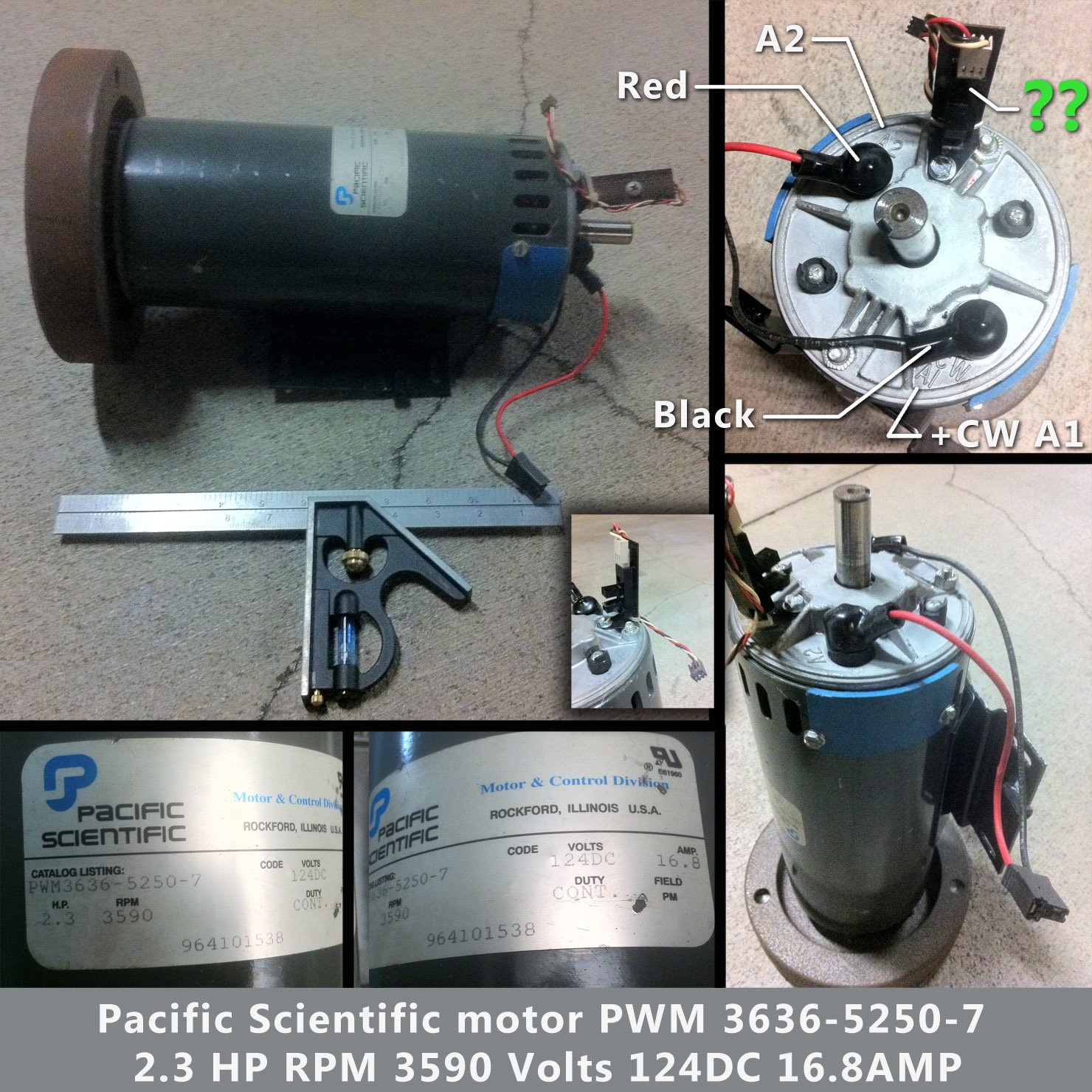Hello,
I am definitely over my head in electronics. But i am willing to listen and learn!
I'm working on a project to build a 'Roto-Molder', for casting hollow resin parts for an art project. Here is a video from YouTube showing the (hopeful) end result. http://youtu.be/xcdkDKkiBeU
That machine is beautiful, but over kill for me. I'm trying to make a wooden version of it. (more in my skill set).
I have acquired a motor for the project (from a treadmill). It is a Pacific Scientific motor ( PWM 3636-5250-7 ) , 2.3 HP, RPM 3590, Volts 124DC 16.8AMP
Here is a picture of it:

I'm looking to be able to adjust the speed of the rotation for this motor.
I'm assuming the Red/Black wires are for powering the motor.
I'm not sure what the lead in this picture is for:

It seems to be 3 wires that connect to one metal plate that is bolted/screwed to the motor. Do you think i can remove this part??
would it be possible for me to purchase a Treadmill DC Motor Controller from ebay like this one: http://r.ebay.com/2M0Nax
and put a 5k POT on it to adjust the speed of rotation? If i were to use a 1k, or a 10k PTO... would i get more control of the motor going slow?
I am definitely not a master at reading electronic diagrams, but it looks like with the Treadmill DC Motor Controller, i would just need to connect a power cord, and then a POT, and then wire the red/black motor wires.... if i were to do this, would I be all set?
Am i correct in this thinking?
Would anyone have any other simple solutions to controlling the speed of this motor? (or is this motor not even capable of achieving my desired results?)
____
as an alternative solution, could i just connect the motor (red/black wires) to a power cable, and then connect a 'Step Less Speed Controller' like this from amazon? http://amzn.com/B000HQAVNI
also as an option, i was thinking of putting some type of timer into this system... maybe some type of wall wart that would turn off the machine after 20-30 minutes. Kind of like how some jacuzzi's have a rotating/timed kill switch?
Thank you, Thank you, Thank you for any advice or suggestions on this project!
I am definitely over my head in electronics. But i am willing to listen and learn!
I'm working on a project to build a 'Roto-Molder', for casting hollow resin parts for an art project. Here is a video from YouTube showing the (hopeful) end result. http://youtu.be/xcdkDKkiBeU
That machine is beautiful, but over kill for me. I'm trying to make a wooden version of it. (more in my skill set).
I have acquired a motor for the project (from a treadmill). It is a Pacific Scientific motor ( PWM 3636-5250-7 ) , 2.3 HP, RPM 3590, Volts 124DC 16.8AMP
Here is a picture of it:

I'm looking to be able to adjust the speed of the rotation for this motor.
I'm assuming the Red/Black wires are for powering the motor.
I'm not sure what the lead in this picture is for:

It seems to be 3 wires that connect to one metal plate that is bolted/screwed to the motor. Do you think i can remove this part??
would it be possible for me to purchase a Treadmill DC Motor Controller from ebay like this one: http://r.ebay.com/2M0Nax
and put a 5k POT on it to adjust the speed of rotation? If i were to use a 1k, or a 10k PTO... would i get more control of the motor going slow?
I am definitely not a master at reading electronic diagrams, but it looks like with the Treadmill DC Motor Controller, i would just need to connect a power cord, and then a POT, and then wire the red/black motor wires.... if i were to do this, would I be all set?
Am i correct in this thinking?
Would anyone have any other simple solutions to controlling the speed of this motor? (or is this motor not even capable of achieving my desired results?)
____
as an alternative solution, could i just connect the motor (red/black wires) to a power cable, and then connect a 'Step Less Speed Controller' like this from amazon? http://amzn.com/B000HQAVNI
also as an option, i was thinking of putting some type of timer into this system... maybe some type of wall wart that would turn off the machine after 20-30 minutes. Kind of like how some jacuzzi's have a rotating/timed kill switch?
Thank you, Thank you, Thank you for any advice or suggestions on this project!





